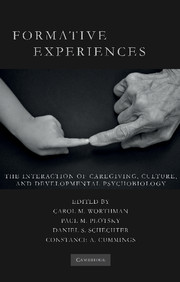Book contents
- Frontmatter
- Contents
- List of Figures
- List of Tables
- List of Contributors
- Foreword by Robert Sapolsky
- Preface
- List of Abbreviations
- Introduction
- SECTION ONE HISTORICAL, CROSS-CULTURAL, AND DEVELOPMENTAL SCIENCE PERSPECTIVES
- SECTION TWO HOW EXPERIENCE INTERACTS WITH BIOLOGICAL DEVELOPMENT
- SECTION THREE FORMATIVE RELATIONSHIPS WITHIN AND ACROSS GENERATIONS
- SECTION FOUR SOCIAL AND CULTURAL CONTEXTS OF CHILDHOOD DEVELOPMENT – NORMATIVE SETTINGS, PRACTICES, AND CONSEQUENCES
- 11 Ethnographic Case Study: Inuit Morality Play and the Danish Medical Officer
- Commentary
- Commentary
- 12 Ontogenetic Perspectives on the Neurobiological Basis of Psychopathology Following Abuse and Neglect
- 13 Ethnographic Case Study: Maria – Cultural Change and Posttraumatic Stress in the Life of a Belizean Adolescent Girl
- Commentary
- Commentary
- 14 Sex/Gender, Culture, and Development: Issues in the Emergence of Puberty and Attraction
- SECTION FIVE FEAR, FUN, AND THE BOUNDARIES OF SOCIAL EXPERIENCE
- SECTION SIX PUBLIC HEALTH, EDUCATION, AND POLICY IMPLICATIONS
- Index
- References
Commentary
Published online by Cambridge University Press: 26 May 2010
- Frontmatter
- Contents
- List of Figures
- List of Tables
- List of Contributors
- Foreword by Robert Sapolsky
- Preface
- List of Abbreviations
- Introduction
- SECTION ONE HISTORICAL, CROSS-CULTURAL, AND DEVELOPMENTAL SCIENCE PERSPECTIVES
- SECTION TWO HOW EXPERIENCE INTERACTS WITH BIOLOGICAL DEVELOPMENT
- SECTION THREE FORMATIVE RELATIONSHIPS WITHIN AND ACROSS GENERATIONS
- SECTION FOUR SOCIAL AND CULTURAL CONTEXTS OF CHILDHOOD DEVELOPMENT – NORMATIVE SETTINGS, PRACTICES, AND CONSEQUENCES
- 11 Ethnographic Case Study: Inuit Morality Play and the Danish Medical Officer
- Commentary
- Commentary
- 12 Ontogenetic Perspectives on the Neurobiological Basis of Psychopathology Following Abuse and Neglect
- 13 Ethnographic Case Study: Maria – Cultural Change and Posttraumatic Stress in the Life of a Belizean Adolescent Girl
- Commentary
- Commentary
- 14 Sex/Gender, Culture, and Development: Issues in the Emergence of Puberty and Attraction
- SECTION FIVE FEAR, FUN, AND THE BOUNDARIES OF SOCIAL EXPERIENCE
- SECTION SIX PUBLIC HEALTH, EDUCATION, AND POLICY IMPLICATIONS
- Index
- References
Summary
Perhaps the starkest interpretation of Eileen Anderson-Fye's case study, “Maria: Cultural Change and Posttraumatic Stress in the Life of a Belizean Adolescent Girl,” is that simply to bestow a psychiatric diagnosis such as posttraumatic stress disorder (PTSD) upon an impressionable young adolescent girl like Maria is to condemn her to suffer from that disorder. There are some who would draw such a conclusion from this chapter. Indeed, there is a litany of professional and public statements to the effect that merely asking about possible child abuse or about certain symptoms associated with child abuse actually causes patients to falsely believe that they were abused – so called false memory syndrome – when, in fact, they were not. For some reason, those who believe in this syndrome regard young female patients as especially susceptible to being influenced into making false allegations of sexual abuse against their fathers.
A more nuanced interpretation would be that by providing a special language with which to talk about troubling experiences one can shape an individual's perception of the experience and, perhaps, even the way in which they symptomatically express the pain that those experiences have caused in them. Just as a doctor's diagnosis of cancer does not actually cause the cancer, it can, nonetheless, completely change how patients think about themselves and how they relate to others.
A diagnosis can also change the way in which doctors and psychotherapists perceive their patients.
- Type
- Chapter
- Information
- Formative ExperiencesThe Interaction of Caregiving, Culture, and Developmental Psychobiology, pp. 351 - 355Publisher: Cambridge University PressPrint publication year: 2010



